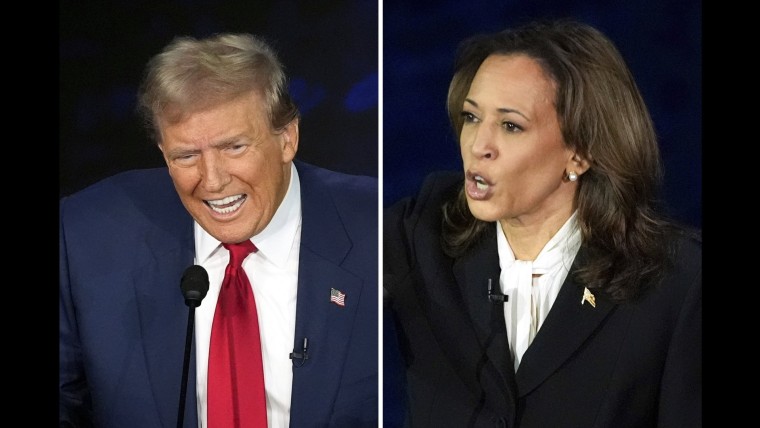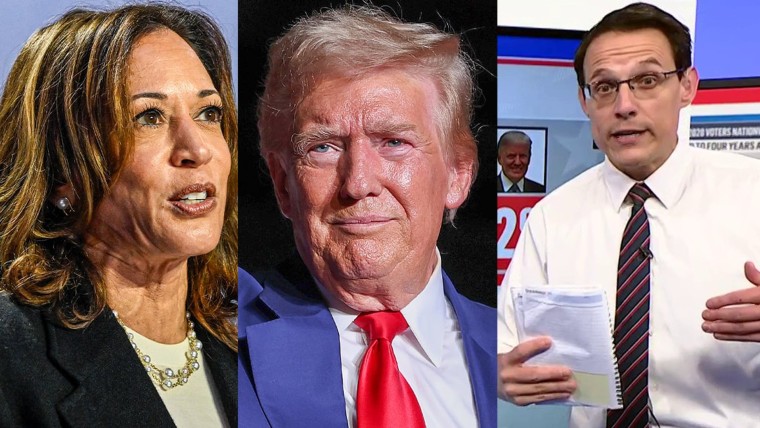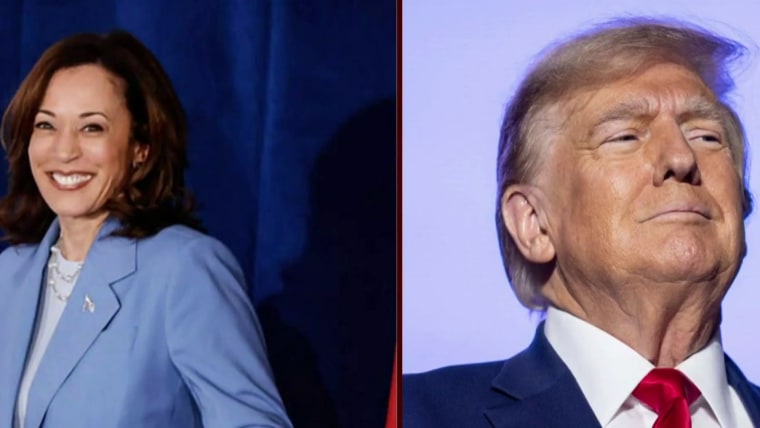It’s one of the enduring mysteries of American politics: Despite the irrefutable evidence that the economy performs better under Democratic presidents by almost any measure, much of the voting public remains convinced that Republicans are better economic stewards. But if recent polling is accurate, glimmers of sense are breaking through. In several recent polls, Vice President Kamala Harris has nearly erased former President Donald Trump’s advantage on the question of which candidate would be better for the economy. If this result holds up, it could be fatal to his chances of winning back the White House. It would be nice if this change were a testament to the voters’ rationality and keen economic understanding. But it isn’t.
In the latest NBC News poll — with a margin of error of 3.1 percentage points — voters give Trump a 50-41 advantage on “dealing with the economy.” That 9-point deficit may not sound like good news for Harris, until you learn that at the beginning of the year, Trump’s advantage over President Joe Biden on that question was more than 20 points.
While the numbers vary somewhat, the overall trend is clear.
Other polls have shown even better results for Harris. A CBS News/YouGov poll found that Trump leads by only 53-47 among those who say the economy is a major factor in their vote. A Fox News poll showed Trump ahead of Harris by 5 points on this measure. An AP-NORC poll showed Trump leading Harris by only 2 points on who voters trust on the economy. A Quinnipiac poll of swing states found a similar gap. A Morning Consult poll show the two tied on the same question. And a Financial Times/University of Michigan poll found Harris leading by 2 points. (The CBS result lies outside the margin of error, while all the other poll findings are within those surveys’ margin of error.)
While the numbers vary somewhat, the overall trend is clear: Voters are much more favorably inclined toward the Democratic nominee on the economy than they used to be — which is a huge win for Harris. Before Biden exited the race, Trump was obliterating him on these economic questions, even though Biden’s economic stewardship was worlds ahead of Trump’s.
The lead Trump enjoyed earlier in the year can be attributed to a combination of amnesia, delusion, and the widely shared sense that the 81-year-old Biden just wouldn’t be up to the job in a second term. Voters somehow forgot how Trump’s mismanagement of the pandemic made the inevitable downturn deeper and more difficult to recover from.

The former president may be fond of asking, “Are you better off now than you were four years ago?” But the appropriate answer is, “Are you kidding?” Four years ago the economy was 10 million jobs in the hole from pre-pandemic levels. The unemployment rate was still 7.8% (today it’s 4.2%). Even before the pandemic, Trump also ballooned the deficit, which Republicans pretend to care about, with tax cuts aimed at the wealthy.
Even if you want to excuse Trump from blame for the pandemic recession (which you shouldn’t), Biden’s economic performance was almost miraculous: millions of jobs created, growth steady, a dramatic surge in manufacturing investment directly spurred by his industrial policy, and an economy that has significantly outperformed our global peers in recovering from the pandemic. That outperformance includes inflation, which spiked globally due to snarled supply chains and corporate price gouging, and which the U.S. recovered from more quickly than peer nations.
There is reason to believe things could get even better for Harris on this score.
Yet millions still believe that not just prices but everything was better under Trump. NPR recently interviewed one Georgia voter who said she’s supporting Trump “because her investments were doing better when he was in office.” Unless she invested in Trump NFTs, it’s hard to imagine what she could be talking about. The day before the 2020 election, the Dow Jones Industrial Average closed at 26,925; last Friday it closed at 42,063, for an increase of 56%. The S&P 500 told the same story: It closed at 3,310 the day before the 2020 election, and finished at 5,702 on Friday, for an increase of 72%.
Nevertheless, for a couple of years now, many have been convinced that the economy is a disaster. One poll taken in May showed that 56% of Americans thought we were in a recession, 49% believed the stock market was down for the year, and perhaps most incredibly of all, 49% said unemployment was near a 50-year high, when in fact it’s near a 50-year low.
Millions also continue to believe that because he’s a rich businessman, Donald Trump must really understand the economy. After all, how could the man behind Trump University, Trump Steaks, and Trump Vodka not be an economic genius?
But that idea seems, finally, to be breaking down. Perhaps some voters have taken a close look at the two candidates’ proposals and are starting to conclude that Harris’ ideas have more merit. Perhaps they’ve seen that both conservative and liberal economists agree that Trump’s plan for across-the-board tariffs would be an economic disaster. Or maybe they have been impressed with Harris’ plan to reduce the price of housing.

More likely, though, is that voters’ feelings are translating into economic conclusions. Just as people felt that Biden looked old and feeble and therefore he couldn’t have been doing a good job on the economy, now many feel that Harris seems serious and competent, and therefore they can trust her to do a better job. Her ratings overall have improved since her successful convention and strong debate performance, so that halo has extended to economics. And as Trump spends every day spreading insane lies about immigrants, perhaps some voters are questioning his ability to handle a whole range of issues.
There is reason to believe things could get even better for Harris on this score. The Fed’s decision to lower interest rates will likely give people confidence that mortgage and car loans will get cheaper. She’ll also probably continue to get a boost from something no lawmaker has much control over: the retail price of gas. The national average is now $3.21 and falling, a full 66 cents lower than it was a year ago, and in many states the price is below $3.00.
By the time we get to the election, Harris may have even opened a real lead on the economy. The basis of voters’ judgment may not be much more rational than when they thought Trump was an economic wizard. But at least the conclusion won’t be so crazy.

